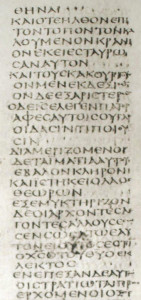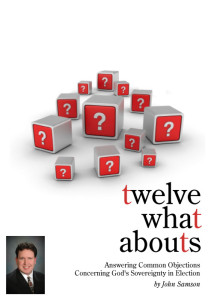 “The Council of Nicea would not have had a clue what the phrase ‘Roman Catholic Church’ even meant, and it is sad that these non-Roman conspiratorialists are always willing to grant to Rome far, far more than history ever does. The Council of Nicea was, of course, the place where the full deity of Christ was defended, despite the rise of Arianism in the decades thereafter.” – Dr. James White
“The Council of Nicea would not have had a clue what the phrase ‘Roman Catholic Church’ even meant, and it is sad that these non-Roman conspiratorialists are always willing to grant to Rome far, far more than history ever does. The Council of Nicea was, of course, the place where the full deity of Christ was defended, despite the rise of Arianism in the decades thereafter.” – Dr. James White
“Run, John, run, the law commands
But gives us neither feet nor hands,
Far better news the gospel brings:
It bids us fly and gives us wings”
– John Bunyan (1628-1688)
“There is nothing in us or done by us, at any stage of our earthly development, because of which we are acceptable to God. We must always be accepted for Christ’s sake, or we cannot ever be accepted at all. This is not true of us only when we believe. It is just as true after we have believed. It will continue to be trust as long as we live. Our need of Christ does not cease with our believing; nor does the nature of our relation to Him or to God through Him ever alter, no matter what our attainments in Christian graces or our achievements in behavior may be. It is always on His ‘blood and righteousness’ alone that we can rest.” – B.B. Warfield
“The gospel news of salvation by grace alone, through faith alone, in Christ alone is summed up with three words—ransomed, redeemed, and reconciled. Those whom Christ has ransomed by His atonement on the cross He has redeemed and, therefore, reconciled them to Himself intimately and eternally.” — Harry Reeder
“You can gather how foolish it is, yea, what an awful derision has taken hold upon so many men’s minds who ridicule pure doctrine and say to us: ‘Ah, do cease clamoring, Pure doctrine! Pure doctrine! That can only land you in dead orthodoxism. Pay more attention to pure life, and you will raise a growth of genuine Christianity.’ That is exactly like saying to a farmer: ‘Do not worry forever about good seed; worry about good fruits.'” – C. F. W. Walther, The Proper Distinction between Law and Gospel: Thirty-Nine Evening Lectures (St. Louis: Concordia, 1928), 20-21
“Standing on the authority of Scripture, the preacher declares a truth received, not a message invented. The teaching office is not an advisory role based on religious expertise, but a prophetic function whereby God speaks to his people.” – Al Mohler
“Our darling sin must die. Do not spare it for its much crying.” – C. H. Spurgeon
“That I am drawing breath this morning is an act of divine mercy. God owes me nothing. I owe Him everything.” – R.C. Sproul
“The motto of all true servants of God must be, ‘We preach Christ; and him crucified.’ A sermon without Christ in it is like a loaf of bread without any flour in it. No Christ in your sermon, sir? Then go home, and never preach again until you have something worth preaching.” – C. H. Spurgeon
“…’if thou art willing’ is a verb in the subjunctive mood, which asserts nothing…a conditional statement asserts nothing indicatively.” “if thou art willing”, “if thou hear”, “if thou do” declare, not man’s ability, but his duty.” – The Bondage of the Will by Martin Luther
“Is it not true, however, that many of us who call ourselves “Reformed” have lost the “sense” of the sheer wonder of this amazing love? Before sovereign grace is a truth to defend, it is a captivating truth to glory in.” – Ian Hamilton
“Accurate knowledge about the nature of revival is not the same thing as being revived!” – Sinclair Ferguson
“From this we may gather that man’s nature, so to speak, is a perpetual factory of idols…Man’s mind, full as it is of pride and boldness, dares to imagine a god according to its own capacity; as it sluggishly plods, indeed is overwhelmed with the crassest ignorance, it conceives an unreality and an empty appearance as God.” – John Calvin, Institutes, 1.11.8
“The Reformation was a time when men went blind, staggering drunk because they had discovered, in the dusty basement of late medievalism, a whole cellar full of fifteen-hundred-year-old, two-hundred proof Grace–bottle after bottle of pure distilate of Scripture, one sip of which would convince anyone that God saves us single-handedly. The word of the Gospel–after all those centuries of trying to lift yourself into heaven by worrying about the perfection of your bootstraps–suddenly turned out to be a flat announcement that the saved were home before they started…Grace has to be drunk straight: no water, no ice, and certainly no ginger ale; neither goodness, nor badness, nor the flowers that bloom in the spring of super spirituality could be allowed to enter into the case.” – Robert Capon, Between Noon and Three
I think good preachers should be like bad kids. They ought to be naughty enough to tiptoe up on dozing congregations, steal their bottles of religion pills…and flush them all down the drain. The church, by and large, has drugged itself into thinking that proper human behavior is the key to its relationship with God. What preachers need to do is force it to go cold turkey with nothing but the word of the cross-and then be brave enough to stick around while [the congregation] goes through the inevitable withdrawal symptoms. But preachers can’t be that naughty or brave unless they’re free from their own need for the dope of acceptance. And they wont be free of their need until they can trust the God who has already accepted them, in advance and dead as door-nails, in Jesus. Ergo, the absolute indispensability of trust in Jesus’ passion. Unless the faith of preachers is in that alone-and not in any other person, ecclesiastical institution, theological system, moral prescription, or master recipe for human loveliness-they will be of very little use in the pulpit.” – Robert Capon, The Foolishness of Preaching
Saint Paul has not said to you, “Think how it would be if there were no condemnation”; he has said, “There is therefore now none.” He has made an unconditional statement, not a conditional one-a flat assertion, not a parabolic one. He has not said, “God has done this and that and the other thing; and if by dint of imagination you can manage to pull it all together, you may be able to experience a little solace in the prison of your days.” No. He has simply said, “You are free. Your services are no longer required. The salt mine has been closed. You have fallen under the ultimate statute of limitation. You are out from under everything: Shame, Guilt, Blame. It all rolls off your back like rain off a tombstone.”
It is essential that you see this clearly. The Apostle is saying that you and I have been sprung. Right now; not next week or at the end of the world. And unconditionally, with no probation officer to report to. But that means that we have finally come face to face with the one question we have scrupulously ducked every time it got within a mile of us: You are free. What do you plan to do? One of the problems with any authentic pronouncement of the gospel is that it introduces us to freedom.” – Robert Capon, Between Noon and Three
And this prayer, brilliantly articulating our grace-averse hearts from Between Noon And Three:
Lord, please restore to us the comfort of merit and demerit. Show us that there is at least something we can do. Tell us that at the end of the day there will at least be one redeeming card of our very own. Lord, if it is not too much to ask, send us to bed with a few shreds of self-respect upon which we can congratulate ourselves. But whatever you do, do not preach grace. Give us something to do, anything; but spare us the indignity of this indiscriminate acceptance.





